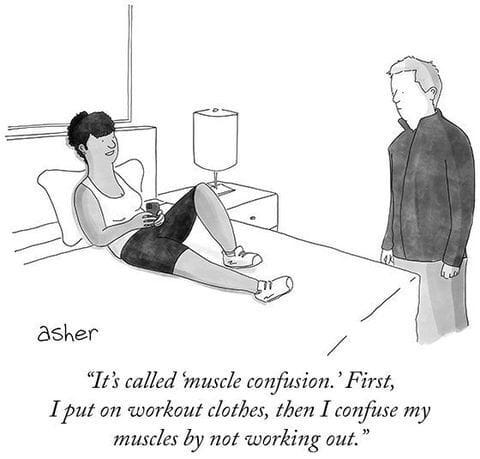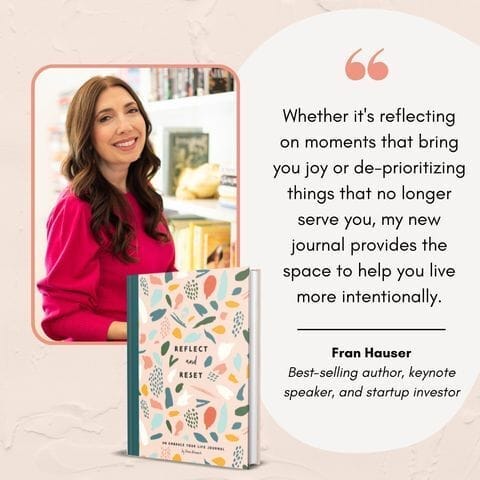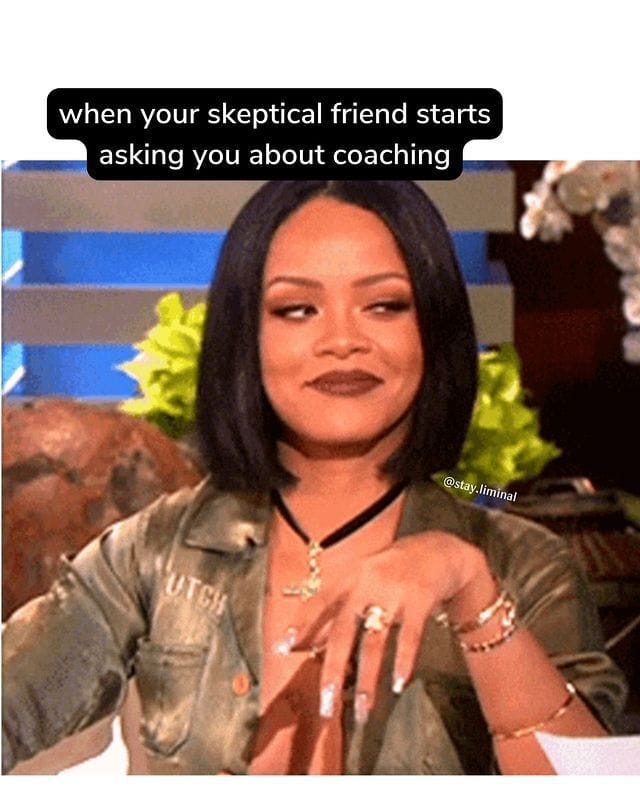Hello friends! I’m trying something a little different this week, and we’ll all see how we like it! (You know I’m always open to feedback—you can simply reply to this newsletter and tell me what you think! Or just say hello!)
Did someone forward you this email? Please subscribe!
Still working on a name for this concept, but I’m thinking something like: an ask, a share, and a question. In this newsletter, I’ve got a request for you readers. I also want to share something I discovered lately that I love. And I have a Q&A with a cool woman who has an interesting new project I think you’ll like.
Let’s get started!
The Ask
I’m struggling right now to get enough exercise, and it’s beginning to bum me out. I want to work out more, but I’m also feeling uninspired. I used to do pilates regularly, and I’m a sometime runner, but I’ve pretty much stopped doing both. I’m not someone who likes punishing workout classes—and please don’t invite me to your power yoga; it’s just not my thing—but I know I would feel better if I were getting more exercise. I feel especially anxious about it with the weather turning colder. I really don’t want to be a total couch potato.
I need some inspiration! How do you fit working out into your busy life? Are there any apps or videos that you like? Do you rely on a workout buddy to keep you motivated? And if yes, how did you find that person? (Also, Jen, can you move back to Brooklyn so I can have a running buddy again. Please and thank you!)
The Share
Today, I get the pleasure of interviewing Fran Hauser about her new journal Reflect and Reset. I’ve known Fran since I worked at Refinery29. We were introduced while she was promoting her first book, The Myth of the Nice Girl—which is still one of my all-time favorites—and she wrote an advice column for me. I received a copy of Reflect and Reset ahead of our talk, and I just love it. It’s broken up into five sections, and each section has a different prompt. My favorite is the “To-Don’t List.”
“You have my permission to purge your to-do list of any tasks that no longer serve you,” Fran writes. “Then write them here and make a promise banish them from your to-do list.”
This is the third time recently that someone has suggested to me the importance of deciding what not to do instead of just focusing on what to do. In my CUNY class, one of our instructors also encouraged us to think about something we should stop doing. And my new Instagram friend Catherine Brown, who writes The Cabro, a newsletter on parenthood and careers, had a post this week about how she’s stopped folding most of her clothes because she decided there are other ways she wants to spend her time. “If folding clothes is your thing, great!” Catherine wrote in the caption. “Consider this inspiration to let go of something else if you need it.”
I have to admit that I really find it difficult to decide what not to do. But the reality is, our to-do lists are endless, and every single one of us can probably come up with a few things that can just drop. And while I think it’s good for everyone to do this exercise, it’s especially helpful if you’re at a transition point in your life or career, like so many of us are right now. Fran’s journal is a wonderful guide if you’re looking for a bit of self-led reflection. I’m not someone who usually likes to journal (that’s what this newsletter is for, LOL), but Fran’s book is so special, I may just have to take up a new habit.
The Q&A
Speaking of transitions, I was very excited to get a chance to talk with Ashley Sumner, who recently launched Liminal, a new kind of coaching program. Liminal matches you with a coach who will work with you to identify your goals (change careers, launch a side business, find your purpose, etc.) and put together an action plan. You can meet bi-weekly with your coach and catch up in between sessions via texting and videos on the Liminal app. The goal is for the program to be flexible and affordable, so it can fit into your busy lifestyle.
This Q&A has been edited for clarity and length.
Tell me a little bit about Liminal and what inspired you to start it?
Ashley: Liminal is a matchmaking company that connects our users to highly vetted coaches who understand how to help people find their purpose and overcome mindset struggles by holding them accountable to make the changes they’ve probably long wanted to make.
Personally, I've done 20 years of therapy and coaching. And I know that's such a privilege. It's also fun for me, and so sometimes I've taken the very small salary that I had and put it toward my own personal growth.
This is an area I have a lot of expertise in, by way of being a seeker myself. Last year, I took a step back to reimagine what a tech product experience might look like to support people as they’re going through transitions.
Liminal, as a name, is meaningful to me. I feel like I'm just floating in liminal space. And I think so many of us are like, What's going on? How do we navigate this uncharted and confusing territory?
A lot of women struggle to spend money on services like this. They might feel guilty investing in their own personal development. Why do you think it’s important for people to invest money in their careers?
Ashley: We spend a third of our lives at work. Most people know about career coaches, but they think of it as something for the leadership team at their company. Or maybe their company offers career coaching as a retention tool, but they don’t feel comfortable being completely open with the coach.
My goal is to modernize the coaching industry. It’s currently unregulated, and it can be kind of a crapshoot. I heard from someone the other day about how it took them six months to find a coach—that’s six months of wasted time, in my opinion.
And coaching can be expensive. There are career coaches charging $10,000 a month for their services. I want to offer that level of coaching but for a consumer audience.
I want to ask a few rapid-fire money questions. To start, what is one money stressor you’re dealing with right now?
Ashley: Well, I'm 35. And for the first time, I’m considering having children. It didn't surface for me until this age. And so I'm thinking about how to take care of something other than myself. There’s a lot of question marks I have, but I want to provide everything for a little being that I could create. So that feels stressful for me right now.
What’s the last thing you spent money on?
Ashley: I just bought a nut milk maker. I feel like I can't find a non-dairy milk that doesn't kill my gut microbiome.
What’s your biggest expense?
Ashley: My personal growth. I pour a lot into my physical and mental and spiritual well-being. Sometimes, I do put myself through cosmic cleanses, so I make sure that it's not like becoming an addiction. The journey of healing is very fun for me—it's my hobby.
What’s something you’re not spending money on right now?
Ashley: I'm kind of on the other side of spending money on clothing, brands, and things like that. It used to be something that mattered to me. I’ve been trying to embrace more simplicity in my day to day. The nut milk maker is the exciting thing I bought last—it's not a new handbag.
Thank you so much, Ashley, for taking time to chat with me!
Ashley has been kind enough to offer Purse readers a chance to try out Liminal, too, with special access to a two-week free trial AND $100 off their first month of Liminal Coaching with the code, ThePurse100.
Fill out this 4-min form (and add "The Purse" as the referer) to try Liminal's career and purpose coaching for free. Ashley tells me that 88% of Liminalists make progress on their goals in just one week, so this is a great way to see if it’s the right program for you. After the trial offer, Liminal memberships start at $290 per month.
I’m fascinated by the coaching industry. I’ve been listening to the third season of The Dream podcast, which explores the pros and cons of coaches. It can be very expensive to hire a coach, and it can be hard to know you’re getting a good one—as Ashley mentioned, there are no certification requirements. I appreciate that Ashely’s team is vetting coaches and then acting as a bit of a matchmaker, making sure Liminal clients find the right coach for their needs. All new clients fill out an intake form, and then you schedule a 15-minute call with a Liminal staffer who asks a few questions to determine your needs and then matches you with a coach. I had my call this week, and I was matched with a coach, but we haven’t had our first meeting yet. I’ll report back on how it works out!
I hope everyone has a lovely week. Thanks as always for reading.
xx
Lindsey










